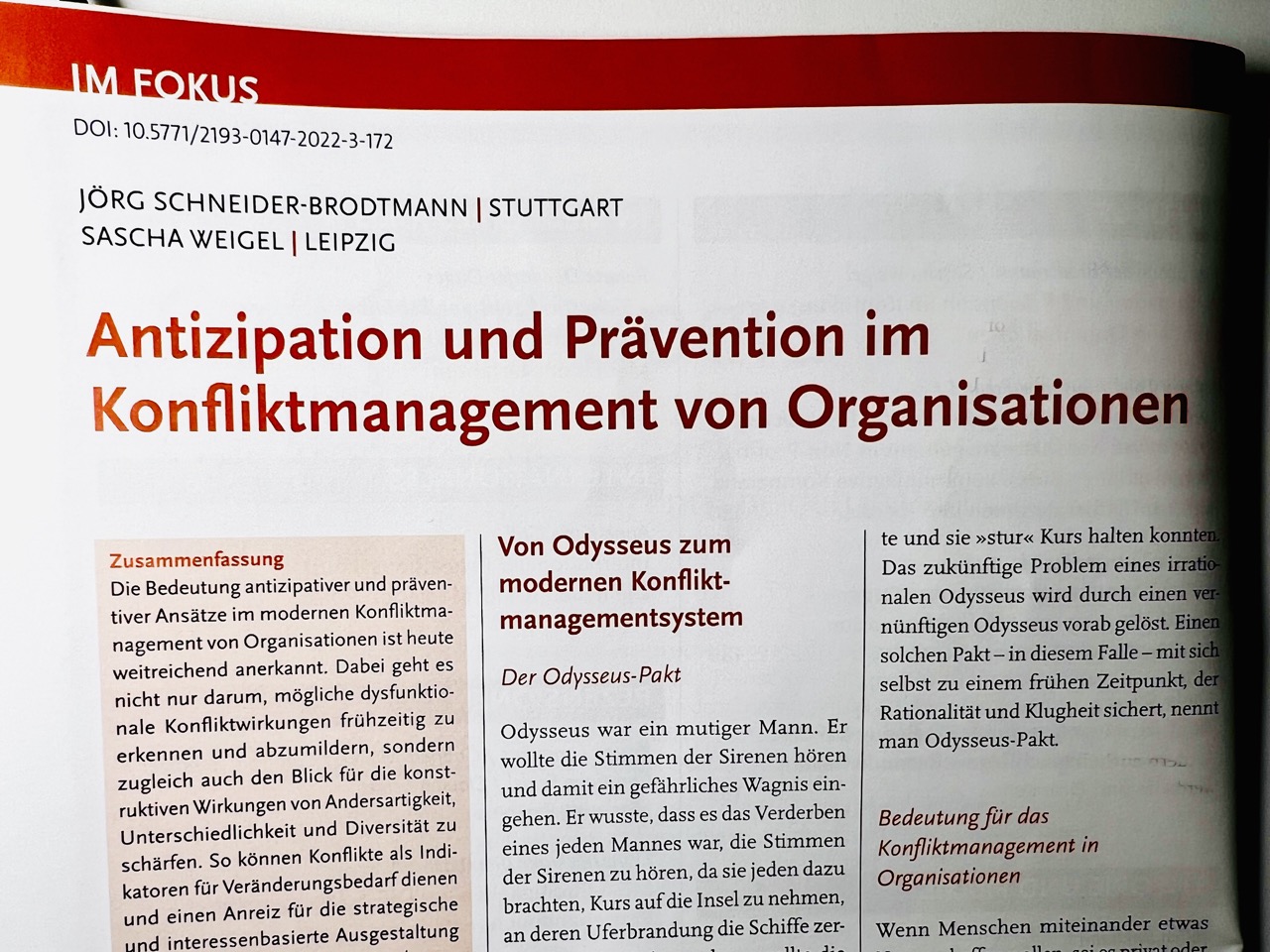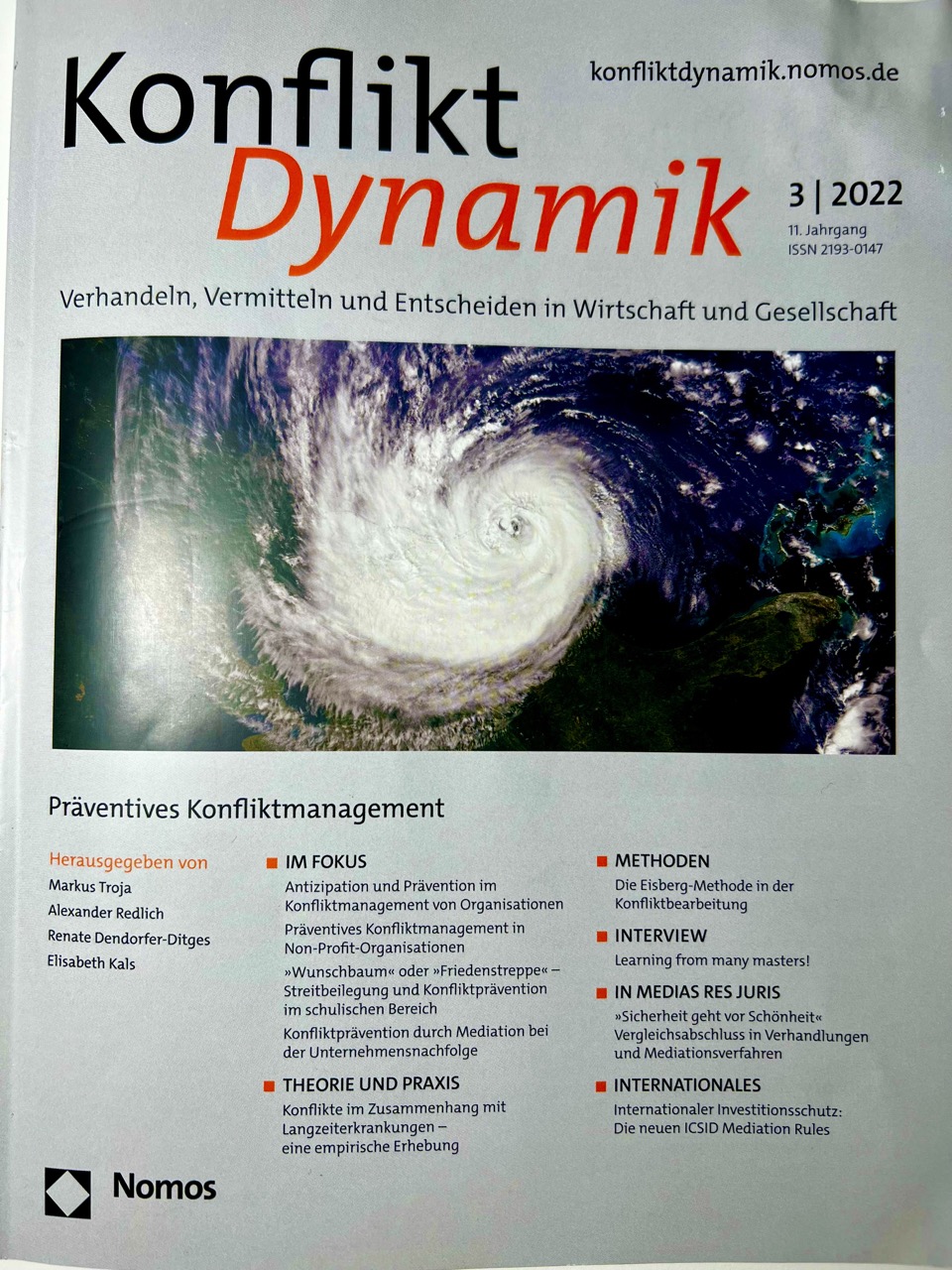Essay: Anticipation and prevention in the conflict management of organisations
in: Conflict Dynamics 3/2022, p. 172 – 179
Dr Jörg Schneider-Brodtmann & Dr Sascha Weigel
Article by Dr Sascha Weigel and Dr Jörg Schneider-Brodtmann for publication in Konfliktdynamik, issue III/2022 with the focus on "Conflict Prevention"
Anticipation and prevention in organisational conflict management
The importance of anticipatory and preventative approaches in modern conflict management in organisations is widely recognised today. The aim is not only to recognise and mitigate possible dysfunctional conflict effects at an early stage, but also to sharpen awareness of the constructive effects of otherness, difference and diversity. In this way, conflicts can serve as indicators for the need for change and create an incentive for the strategic and interest-based design of internal organisational structures on the one hand and external business relationships on the other. With this in mind, the following article presents an overview of various approaches and manifestations of anticipatory and preventative conflict management in organisations. A structuring distinction is made between internal organisational measures on the one hand and measures in business-to-business (B2B) transactions on the other.
Extracts
From Odysseus to the modern conflict management system
1 The Ulysses Pact
Odysseus was a brave man. He wanted to hear the voices of the sirens and take a dangerous risk. He knew that it was every man's undoing to hear the sirens' voices, which made them set course for the island where the ships were wrecked by the surf. And yet, he wanted to hear the sirens sing.
But Odysseus was also a clever man. He knew that his later self, who heard the sirens, would not make wise decisions but would set course for the coast. The clever "Odysseus now" had to protect the stupid "Odysseus later" from such folly.
It was therefore important to arrange things now for later so that smart decisions could still be implemented when the fool was at the helm. According to legend, Odysseus heard the sirens singing and mastered the dangers: he ordered his men to tie him to the mast and not to obey his later "orders" to set course for the coast. The entire ship's crew covered their ears with melted wax so that the siren song did not reach them and they could "stubbornly" stay on course. The future problem of an irrational Odysseus is solved in advance by a rational Odysseus. Such a pact – in this case – with himself at an early stage, which ensures rationality and prudence, is called Odysseus' pact…
2. importance for conflict management in organisations
When people want to create something new together, whether privately or professionally, there will be conflicting interests and realisation intentions, in short: they will come into conflict with each other. Sometimes more, sometimes less. And after all that is known about the dynamics of conflicts, it is not the worst idea to take precautions: To make smart decisions in advance for the cases in which you are no longer in your right mind and have lost sight of the big picture or the actual and common goal.
The starting point is the realisation that opposites are essential elements of social life and that conflicts are not a bad thing in themselves ("the song of the sirens is beautiful"). For this reason, the core aim is not to prevent conflicts from arising at all costs, but to keep their escalation and possible destructive development under control. The (potential) conflict parties should be empowered to deal with their differences in a less destructive way (Glasl 2013, p. 22). This ties in with the distinction recognised in modern conflict management between conflict prevention and conflict escalation prevention (PWC/EUV Study 2016, p.89).
Both forms of the concept of prevention aim to mitigate the dysfunctional effects of conflicts; on the one hand at the time (before) they arise and on the other hand when they are being played out. The object of preventive conflict management is therefore not only the early recognition of differences, diversity of perspectives and interests and the associated conflict potential (anticipation), but also preparatory action and organisation in the present in order to be able to react rationally and constructively in the future when the identified conflict potential unfolds (prevention). Odysseus paved the way for this.
It seems sensible not only to keep an eye on possible dysfunctional conflict effects and mitigate them where necessary, but also to sharpen our focus on the constructive effects of otherness, difference and diversity. Because if the new, innovative and forward-looking often only prevails in conflict against the resistance of the present and habit, then it is also important to anticipate and preventively keep an eye on these potentials and help them to prevail.
In this respect, anticipation measures are primarily aimed at ensuring that the constructive effects of conflicts do not fizzle out, but are instead utilised for the benefit of the organisation (utilitarian approach)…
II Approaches and manifestations of anticipatory and preventive conflict management
- Internal measures
- Legally mandated preventive and anticipatory conflict management
- Privately initiated preventive or anticipatory conflict management
- Measures in business transactions
- Initiation and establishment of business relationships
- Realisation and execution of business relationships
III Where is the journey going?
…“
Complete bibliography for the essay:
- Esser, Axel / Wolmerath, M.: Bullying and psychological violence. The guide for victims and their representatives, 10th edition, Frankfurt am Main 2020.
- Glasl, Friedrich: Konfliktmanagement, 11th edition, Stuttgart 2013.
- Gläßer, Ulla / Kirchhoff, Lars / Wendenburg, Felix (ed.): Conflict management in the economy. Approaches, Models, Systems, Baden-Baden 2014; therein:
-
- Gramm, Helmuth: In-house mediators and mediator pools – not just a conflict management instance, pp. 73-92.
- Kirchhoff, Lars / Wendenburg, Felix: Professionalisation perspectives - conflict management as a service and as an instrument of value-oriented corporate management, pp. 473-487.
- Knobloch, Thomas: Conflict management as an integral part of the risk management of corporations, S. 375-393.
- Hoffmann, Hannah: Mediation clauses in contracts between companies, Diss. Cologne, 2019.
- Klowait, Jürgen / Gläßer, Ulla (ed.), Mediationsgesetz – Handkommentar, 2nd ed. Baden-Baden 2018.
- Knobloch, ThomasIntegration of conflict and risk management (CMRM model). A business challenge for companies, Konfliktdynamik 2012, 224-232.
- PricewaterhouseCoopers / European University Viadrina (ed.): Konfliktmanagement als Instrument werteorientierter Unternehmensführung, Frankfurt (Oder) / Frankfurt a.M. 2013.
- PricewaterhouseCoopers / European University Viadrina (ed.): Konfliktmanagement in der Wirtschaft - Entwicklungen eines Jahrzehnts, Frankfurt a.M. 2016.
- Round Table Mediation & Conflict Management of German Business (RTMKM): Position paper of the German business community on the implementation of the EU Mediation Directive, ZKM 2009, 147-152.
- Saintot, Valerie / Friedrich, Kristina: The MeetingLAB of the European Central Bank. A report from the meeting room, OrganisationsEntwicklung 2016, 6-12.
- Schmitz, Anja / Beer, Anne / Fölsing, Jan: Barcamps – Seismographs for emergent change. Toolbox (62) OrganisationsEntwicklung 1/2020, 85-92.
- Schneider-Brodtmann, Jörg: Conflict prevention through negotiation in business, ZKM 2019, 225-227.
- Schneider-Brodtmann, Jörg: Deal Mediation. Mediation as a process for negotiation and project support and as a means of conflict prevention in business, Frankfurt a.M. 2021.
- Unberath, Hannes: Mediation clauses in contract drafting, procedural effects and effectiveness, NJW 2011, pp. 1320-1324.









Leave A Comment